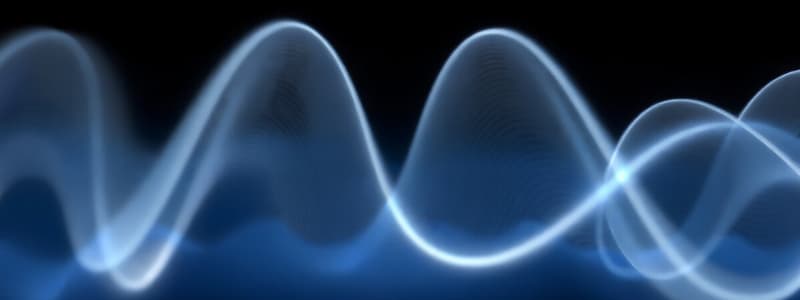Podcast
Questions and Answers
What happens to the observed frequency when the source of a wave moves toward the observer?
What happens to the observed frequency when the source of a wave moves toward the observer?
- The observed frequency fluctuates randomly.
- The observed frequency remains the same.
- The observed frequency is lower than the source frequency.
- The observed frequency is higher than the source frequency. (correct)
Which equation correctly represents the observed frequency when the source is moving away from the observer?
Which equation correctly represents the observed frequency when the source is moving away from the observer?
- $f_0 = \frac{v + v_s}{\lambda_0}$
- $f_0 = \frac{v}{\lambda_0} - v_s$ (correct)
- $f_0 = \frac{v}{\lambda_0} + v_s$
- $f_0 = \frac{v - v_s}{\lambda_0}$
What does the observed frequency depend on when the source and observer are moving towards each other?
What does the observed frequency depend on when the source and observer are moving towards each other?
- Only the frequency of the source.
- Only the speed of the observer.
- The wave speed and the speed of the source. (correct)
- The wavelength of the wave and the observer's speed.
In the Doppler effect, what does 'v' represent?
In the Doppler effect, what does 'v' represent?
When the source is moving towards the observer, what happens to the pitch of the sound?
When the source is moving towards the observer, what happens to the pitch of the sound?
Under which condition does the observed frequency decrease?
Under which condition does the observed frequency decrease?
What is the effect on the observed wavelength when the source approaches the observer?
What is the effect on the observed wavelength when the source approaches the observer?
What happens to the observed frequency if the relative speed of the source is higher than the speed of the observer moving away?
What happens to the observed frequency if the relative speed of the source is higher than the speed of the observer moving away?
How does the Doppler effect impact electromagnetic waves when the source moves toward the observer?
How does the Doppler effect impact electromagnetic waves when the source moves toward the observer?
What is the implication of the equation $f_0 = \frac{v + v_s}{\lambda_0}$ when the source is stationary?
What is the implication of the equation $f_0 = \frac{v + v_s}{\lambda_0}$ when the source is stationary?
Flashcards are hidden until you start studying
Study Notes
Doppler Effect
- The Doppler effect describes the change in observed frequency of a wave when the source and observer are moving relative to each other.
- When the source and observer are stationary, the observed frequency is equal to the source frequency.
- When the source moves towards the observer, the observed frequency is higher than the source frequency, resulting in a higher pitch. The wave shifts towards blue in the electromagnetic spectrum.
- When the source moves away from the observer, the observed frequency is lower than the source frequency, resulting in a lower pitch. The wave shifts towards red in the electromagnetic spectrum.
Doppler Effect Equation
- The Doppler effect equation is used to calculate the observed frequency of a wave:
f0 = (v * fs) / (v ± vs)
- f0 is the observed frequency
- v is the wave speed
- fs is the source emitting frequency
- vs is the relative speed between the source and observer
- + vs indicates the source is moving away from the observer
- - vs indicates the source is moving towards the observer
Doppler Effect Summary
- The Doppler effect is a fundamental concept in physics, with applications in various fields, including astronomy, medicine, and radar.
- The effect explains the change in frequency of sound waves, light waves, and other forms of electromagnetic radiation.
- The Doppler effect enables scientists to study the motion of stars, galaxies, and other celestial objects.
- It also forms the basis for various medical imaging techniques, such as ultrasound.
Studying That Suits You
Use AI to generate personalized quizzes and flashcards to suit your learning preferences.




